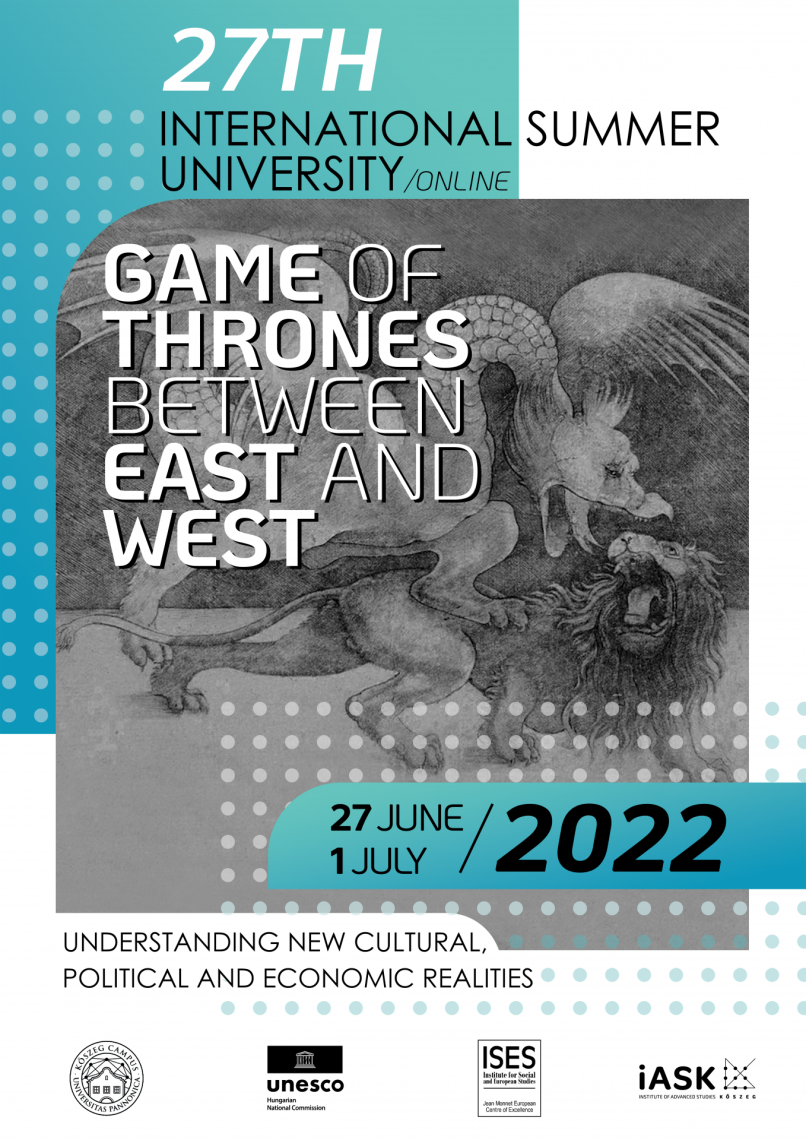Invited Speakers
- Izabella Agárdi (Hungary) Research Fellow at iASK
- Mladen Andrlic, Ambassador of Croatia
- Timothy Yaw Acheampong (Ghana) Research Fellow at iASK, PhD student at the University of Szeged
- Béla Básthy (Hungary) Mayor of Kőszeg
- Károly Binder (Hungary) pianist, composer, Research Fellow at iASK
- János Bogárdi (Germany) Professor at University of Bonn, Research Fellow at iASK
- Daniel Brooks (Canada) Professor Emeritus at the University of Toronto, research fellow at the Royal Society of Canada
- György Csepeli (Hungary) Professor at ELTE, Research Fellow at iASK
- Icaro de Lima Barroso Cavalcanti, Federal University for the Latin American Integration
- Rozita Dimova (Macedonia) University of Ghent
- Muhammad Yunas Fitra (Indonesia) Research Fellow at iASK
- Katalin Galambos (Hungary) Research Fellow at iASK
- Goran Stevchevsky, Ambassador of the Republic of North Macedonia to Hungary
- Misha Glenny, Award-winning Author (UK)
- Anja Grabovacz, Visegrad Insight
- Tímea Jablonczay (Hungary), Research Fellow at iASK, Professor at the University of Milton Friedman, the Department of Media and Cultural Studies
- Jody Jensen (Hungary) Director of the Polanyi Centre at iASK, Jean Monet Professor at University of Pannonia
- Elene Jibladze (Georgia) Education Policy Specialist at Georgian Ministry of Foreign Affairs
- Jelena Jurišić (Croatia) Professor at the Department for Croatian Studies, University of Zagreb
- Kavan, Zdenek, University of Sussex
- Andrey Kortunov (Russia)
- Anikó Magasházi (Hungary) Research Fellow at iASK
- Mónika Mátay (Hungary) Associate Professor at the Institute of History at Eötvös Loránd University and a permanent fellow at iASK
- Ferenc Miszlivetz, Director of iASK, Jean Monet Professor at the University of Pannonia
- Zoltán Mizsei (Hungary) musician, Research Fellow at iASK
- Nidhi Nagabhatla (Germany) Senior Research Fellow at UNU
- Ferenc Németh (Hungary) Research Fellow at the Institute for Foreign Affairs and Trade
- Nepop Ljubov, Ambassador of Ukraine
- Dimitar Nikolovski (Macedonia) Associate Fellow at iASK, Director of Eurothink
- Csaba Olay (Hungary) Professor at Eötvös Loránd University
- Konrad Pawlowski, Instytut Europy Srodkowey
- Tamás Pesuth, Corvinus University of Budapest
- Attila Pók (Hungary) Research Fellow at iASK
- Tetiana, Poliak-Grujic, Visegrad Insight
- Marco Puleri (Italy) University of Bologna
- Orsolya Racz (Slovakia) Deputy Director at GLOBSEC Policy Institute, Research Fellow at iASK
- Miklós Réthelyi (Hungary) Professor Emeritus at Semmelweis University and President of the National Committee of UNESCO
- Jacques Rupnik, CERI-Sciences Po
- Lilia Shevtzova, Chatham House
- James M. Skelly (USA) Research Fellow at iASK, Director of the Centre on Critical Thinking
- Krassen Stanchev (Bulgaria) Sofia University
- Ivana Stepanovic (Serbia) Research Fellow at iASK and Institute of Criminological and Sociological Research
- Igor Stipic (BiH) Research Fellow at iASK
- András Surányi (Hungary) Film Director
- Sándor Szabó (Hungary) European Commission
- Ravid Taghiyev (Azerbaijan) Research Fellow at iASK
- Sanja Tepavcevic (Hungary) Research Fellow at iASK
- Oleg Tulea, Ambassador of Moldova
- Dániel Váczi (Hungary) musician, inventor, Research Fellow at iASK
- Klaus Wölfer (Austria) former Ambassador
SHORT HISTORY OF ISU (1996-2021)
Since 1996, the International Summer University has been a great opportunity for social scientists, policymakers, researchers and students to meet and discuss the current challenges of the times and the most important issues in international cooperation.
The aim of the Summer University is always to create a dialogue between speakers and students and the general public, where not only different views are brought together, but also substantive proposals for solutions to localized global problems that affect us today.
2021: The 26th International Summer University titled, The Global Entangoment of Central Europe , in view of the epidemic situation, took place in hybrid form in Kőszeg.
Judit Varga, Hungarian Minister of Justice, was invited to speak for the first time. Speakers included Katalin Bogyay, former Hungarian Ambassador to the UN, Klaus Wölfer, retired Austrian diplomat, Mladen Andrlić, Croatian Ambassador to Budapest, Tibor Bial, Ambassador of the Czech Republic to Hungary and Andor Nagy, Hungarian Ambassador to Austria.
The first day of the International Summer University focused on Central Europe’s position in Europe and the Visegrad 4, where invited guests discussed the region’s unique identity and the future of Central European cooperation.
The next day, the Covid-19 epidemic and the new dimensions of governance: the role of the state was discussed, and on Wednesday, the crucial role of Western states in sustaining democracy and the challenges it faces, such as populism and the Euroscepticism that often goes with it.
Thursday’s theme was international communication strategies and the use of soft power in diplomacy. The course was concluded with a panel discussion on „The Future University – The Future of Education: A New Chance for Central Europe?”
On this topic, Ferenc Miszlivetz, Director, has previously said that rethinking the role of universities and the cooperation of cities could bring a revolutionary breakthrough. iASK is a good example: an open, horizontally collaborative type of institution that supports the achievement of new university research-strategy-development goals in the region.
A 1996-2020 közötti Nemzetközi Nyári Egyetemek rövid összefoglalói.
Az elmúlt 25 év Nemzetközi Nyári Egyetemeinek előadói listája ABC sorrendben.
